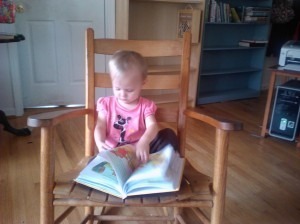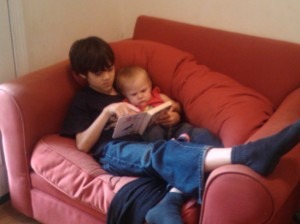Last week I met three fellow homeschooling mom friends at one of those indoor jump places. As our kids played we chatted about homeschooling, books and Jane Austen.
And reluctant readers. Turns out each of us have one.
In a house full of bibliophiles, I also have a child who I consider to be a reluctant reader. But he is very nearly reformed at the moment. 🙂
In 3 out of 4 cases, the child was male, so I will use the male gender for this post. While I generally eschew gender stereotypes, it’s pretty much established that a reluctant reader is more likely to be male.
If a household doesn’t value reading, then the kids aren’t likely to become big readers. Being read to and having lots of books around and parents who read a lot generally makes for a literate kid. But I trust that none of the readers of this blog are slackers in this area, so I’ll discuss the other kinds of issues that can cause a child to be a reluctant reader.
I think there are three basic reasons why a child might not love reading.
They are: the child can’t read well and so it’s a chore to do so, the child who has a short attention span/memory and can’t get involved in the story, and the child has a kinesthetic learning style, meaning he prefers to move around, take things apart, and use his hands to learn.
First, rule out whether this child is struggling with the mechanics of reading well.
If this is the case, and the child is struggling to read, go back to a basic phonics program and review it. The Ordinary Parent’s Guide to Teaching Reading is excellent. If you drop everything and do phonics for a few weeks, this might solve the problem.
(Don’t forget an eye check if it’s been awhile. My 7 year old began to complain about her eyes, and at first I thought she was faking, but after taking her in for an exam, she needed glasses after all. She’s been reading a lot more, and reading better, since she got them.)

If it isn’t a case of the child not being able to read well but simply preferring to do other things, here are a few pieces of advice that have worked for us.
First, let me state that I’m skeptical of some professionals who want to diagnose a learning or reading disability when the problem could be solved by a patient parent.
Back to my morning with the other homeschooling moms. One of them said she has a friend whose son was struggling with reading, so he took him to a shrink.
Huh?
Anyway.
The shrink said that he had no short term memory, and as a result he wasn’t reading or comprehending well. As if this is a life sentence. I can’t help but be skeptical of this.
I believe memory is a muscle that can be strengthened. Since when is “not paying attention long enough to make sense of what you read” a mental illness? If it is, I bet most Americans are crazy, since many people in this country don’t pick up a book to read for pleasure after they graduate.
(Shudder!) I think this is because TV, internet reading (if it’s exclusive) and the like lead to lazy habits. We don’t have to think anymore.
The worst part about this is that my friend then said that she was convinced that her son suffered from the same malady. While I was at first concerned about coming across as a know-it-all, I realized that this mom was really vexed by the situation.
So I told her that my opinion after much research and observation, is that many things we call an illness nowadays is just our low expectations. In generations past, there was much emphasis on memorization in education. I remember doing narration and dictation in school, and the friend I mentioned?
She is from Italy and told me that there, she had to memorize long poems – such as Dante’s Inferno. She also had a lot of dictations and riassunto (summarizing).
Now, kids are entertained with electronic devices that do all the imagining and remembering for them, and cell phones with everyone’s phone number programmed into them. (When I have kids to my home I ask them for their mother’s cell phone # and the majority do not know it.)
They don’t have to remember anything. Of course, there are kids with a bona fide learning disability but I think they’re truly rare.
Lest you think I’m some kind of expert with perfect kids, let me mention that last year, my 11 year old son had some problems with homeschooling and many days ended in tears for him (and me). This year he is doing wonderfully and has made so many strides in reading and grammar, because of my change in approach.
The only change? Doing narration and dictation.
At first dictation was terribly difficult for him but now he is quite good at it. Dictation and narration help to strengthen the memory muscles so the child can a) pay better attention to what he’s reading and b) retain it long enough to make some sense of it.
A brief description of dictation and narration:
Dictation simply means you read aloud a sentence (or two or more, depending on ability) that you choose to the child. Encourage him to “see” the sentence in his mind and to listen carefully.
Tell him beforehand that you will only read it “X” number of times (at first I would have to read the sentence(s) over and over but now I only read them 3 times and he’s got it!) so they know they had better pay close attention. After you have read it several times, ask him to say it back to you.
If you need to, prompt him one word at a time. Have him say it over and over until he’s got it, then ask him to write it down. Watch while he does it so you can correct any errors (in spelling, punctuation, etc) immediately.
The dictation sentences are prepared for me in the Writing With Ease books, but you could choose anything: a short scripture, lines from a book you’re reading, anything you like.
Narration means that you read the child a passage aloud and then have them summarize it briefly for you in their own words. Insist that they use complete sentences. If they don’t, I gently remind them to restate their answer in a complete sentence.
We do narration after reading our history lessons for Story of the World, and a couple of times a week as part of their writing work (from Writing With Ease).
Narration and dictation help with that memory issue mentioned earlier. Julien used to be the type of kid who just could not get the sense of what he read. Whether I read it or he read it himself, he would need me to restate the main points aloud to him.
No longer.
Narration and dictation have helped him discipline his mind to hold ideas in it longer. Which is the whole point!
As far as a child being a kinesthetic learner and needing to move about, well there’s not much you can do about that. Some kids will be that way all their lives. I know people who can’t talk on the phone unless they’re pacing the floor.
Or who cannot speak unless they’re gesturing passionately. Some people can take things apart and put them back together again and build things that have the rest of us scratching our heads. They can also read maps better than anyone else.
That doesn’t mean they won’t learn to love reading.
A final tip: try to associate reading with pleasure. Read to a baby or toddler while they nurse or rock to sleep. Don’t push a child to learn to read too early. Make books fun.
Discard (not permanently, just until another time) a title that doesn’t get you and your child excited right away.
Read aloud with children even when they’ve been reading well for years.
We do a nightly read aloud as a family, including mom, dad, teens and little kids. I also do read alouds with the kids as individuals if they need it.
Another suggestion?
Limit electronic entertainment and ban it outright occasionally. We do a weekly Screen Sabbath where noone uses screens (even parents with their phones). During Quiet Time/Nap Time, no screens are allowed.
Kids who might not otherwise will pick up a book out of sheer boredom which is what you want!
It’s also a good idea to assign an older child to read to a younger one. It makes them feel grown-up and is a good way for them to bond.
I love this book for research, inspiration, motivation and suggestions: The Read Aloud Handbook by Jim Trelease. Another wonderful pick is How to Get Your Child to Love Reading by Esme Raji Codell.
More about helping the reluctant reader:
How to get your kids to love reading
The pleasure of having your child read to you
What are your tips for encouraging a reluctant reader?



Great tips! My 11 year old has a tough time summarizing so I think I will try some of the things you listed here. I used to say she had a hard time with reading comprehension, but she’s 11 now and it will only get harder for her if she doesn’t grasp it now.
I see we share the same faith! By the theocratic books in the background, and some of your scriptural quotations taken from the New World Translation. I’ve been perusing your site and it is fantastic, we have so much in common. My hubby and I hope to have about 4-6 children, we will homeschool, we eat real food (I’m drinking raw milk at the moment, and we had grassfed liver for dinner, my 19 month old LOVES it!) I am tandem nursing my two little ones who were natural midwifed homebirths (well, the first was, the second was supposed to be) don’t vaccinate, loooove reading, and try to live as naturally as possible. sorry for going on so, I’m just excited to ‘meet’ someone who shares our faith AND has some many of the same interests, most of the sisters here, in Canada, although lovely, don’t know much about those subjects.
I will be visiting your blog often and if you ever have the time or inclination visit my little blog or send me an email, I’d love to chat!
Agape, Tania and family